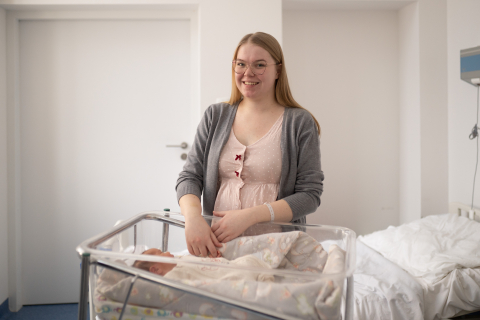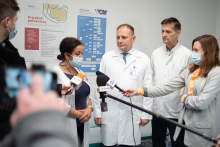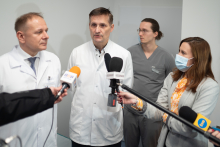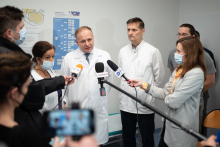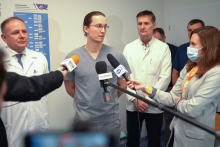This is a joint success for the medical teams from the clinics of the Silesian Medical University and the Medical University of Warsaw. Thanks to their efforts, the happy mother will go home with her dream baby in her arms. This was no ordinary birth! And Ms Patricia is not your ordinary mother.
On 11 June 2019, Ms Patrycja underwent a lung transplant at the Silesian Centre for Heart Diseases. She was 19 years old at the time. The transplant was due to total respiratory failure in the course of cystic fibrosis. Three years after surgery, with very good function of the transplanted lungs, the patient became pregnant after optimisation of immunosuppressive (anti-rejection) treatment and appropriate preparation.
Successful pregnancy is possible after lung transplantation, but caution is advised as these are very high-risk pregnancies. In some cases, it is even recommended that pregnancy be avoided during the first 2-3 years after transplantation. Indeed, numerous complications are possible, such as pre-eclampsia, hypertension, diabetes, infections, as well as birth defects and premature births associated with some common transplant rejection drugs.
A woman with cystic fibrosis, following a lung transplant performed at the Silesian Centre for Heart Diseases in Zabrze, never thought she would one day give birth to a child. She made her decision guided by the comments of the transplant ologists monitoring her health all the time.
– These conversations went on for hours. I saw her great determination and constantly monitored the results. Patrycja comes from the Mazovian Voivodeship, so to her it was logistically optimal to give birth in the highly prestigious University Centre for Women and New-born Health,” says Dr UCZKiN. Marek Ochman, PhD, coordinator of the Lung Transplantation Unit with Cystic Fibrosis Sub-Division, Thoracic Surgery Sub-Division and Lung Disease Sub-Division at the Silesian Centre for Heart Diseases in Zabrze.
– Such pregnancy should be planned and carried out in close collaboration between the patient, the transplant team and the specialist multidisciplinary medical team. This was also the case here. Here I would like to especially thank Anna Cyganek, MD, who managed the patient's pregnancy from the very beginning, providing highly specialized care and coordinating the participation of other specialists - Says Professor Artur Ludwin, Head of the 1st Department of Obstetrics and Gynaecology, MUW. The Clinic team took on this difficult task. The specialists at UCZKIN have been managing pregnancies in women after organ transplants for years and have extensive experience in this field.
At the end of the pregnancy, the patient’s perinatal care was coordinated at UCZKIN by Doctor Zoulikha Jabiry-Zieniewicz. And how did the birth go?
Head of the 1st Department of Obstetrics and Gynaecology, MUW Professor Artur Ludwin: – We prepared for a planned caesarean section, taking into account the pelvic position of the foetus. In such cases, we must be prepared for all possible complications. Including transfer of the patient to the Intensive Care Unit with access to extracorporeal blood oxygenation (ECMO) technology. We have prepared for all this. However, labour started a week earlier than the planned termination. At 37 weeks and 5 days in the morning, the patient notified us that her foetal waters had drained. Biophysical studies confirmed foetal well-being. In preparation for the caesarean section, things began to change. Already in the operating theatre, we began to observe the abnormalities of the foetus’s heart rate, its started to slow down all of the sudden. We had to immediately perform a caesarean section and extract the baby. I performed the caesarean section together with Professor Bronisława Pietrzak and Jabiry-Zieniewicz, PhD, it was a really fast-paced team action. The baby required neonatal support and initially on the first day – support with continuous positive airway pressure. On the following day, there was no longer a need for respiratory support.
Poland’s first completed pregnancy in a woman after lung transplantation is an important step in the history of both Polish transplantology and obstetric care for women after organ transplantation.
The UCZKiN team that performed the caesarean section and cared for the new-born: prof. Artur Ludwin – Head of the 1st Department of Obstetrics and Gynecology; prof. Bronisława Pietrzak; dr hab. Zoulikha Jabiry-Zieniewicz obstetrician gynecologist; dr Jacek Witwicki - neonatologist; dr Jan Biławicz - anesthesiologist; lek med. Jacek Lipa.
The original version of the information mistakenly lacked a section describing the contribution of Dr. Anna Cyganek to the described medical success, for which we apologize.
